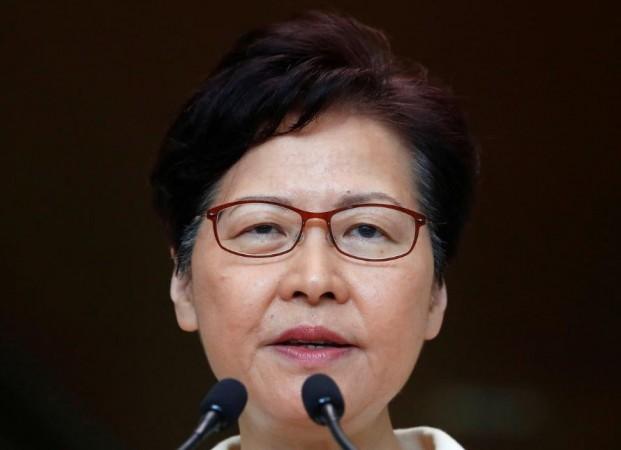
Hong Kong leader Carrie Lam on Tuesday, September 3, said that she never offered to resign and rebuffed reports of Beijing stopping her from stepping down. She asserted that deciding to not quit was her own "choice".
The Chief Executive of the city was responding to a Reuters report citing a voice recording that revealed Lam was "very, very limited' in solving the political crisis was heard saying that she has to serve "two masters" as the issue has moved "to a national level", a suggested reference to the Chinese leadership.
At the weekly Executive Council meeting, Lam clarified that she never contemplated resignation over the ongoing protests and asserted that the city could solve the issues without interventions from China.
"I have not even contemplated discussing resignation with the central people's government. The choice of not resigning is my own choice," she said adding that "Up till now, the central government still thinks (the Hong Kong) government has the ability to handle this."
The senior Hong Kong leader expressed her disappointment that audio clip of her comments at a private meeting had been leaked and said that she was trying to explain that resignation was an easy option during the crisis.
"I told myself repeatedly in the last three months that I and my team should stay on to help Hong Kong, to help Hong Kong in a very difficult situation, and to serve the people of Hong Kong," she said.
The political crisis in Hong Kong has escalated since it began in June after demonstrators protested against the contentious extradition bill. More than 900 people have been arrested, including noted pro-democracy activist Joshua Wong, known for leading the Umbrella Movement in 2014.
MORE PROTESTS
Students from schools and universities in Hong Kong on Tuesday continued to boycott classes and held democracy rallies for the second day.
The weekend was marred with worsening violence after the protesters and police clashed and led to burning barricades, throwing petrol bombs and police retaliating with water cannon, tear gas and batons.
Demonstrators also blocked roads and public transport links to Hong Kong airport on Sunday. The MTR subway station in Tung Chung was also damaged after protesters ripped out turnstiles, smashed CCTV cameras, glass panels and lamps with metal poles.
The Hong Kong protests continue to escalate as the Chief Executive, Carrie Lam, agreed to hold dialogues and listen to the demonstrators but refused to commit to withdraw the contentious extradition bill that led to the political crisis.
Activists and lawmakers have put forward five demands -- the bill's withdrawal, an independent investigation into police brutality, a stop in describing the protests as "rioting", Lam's resignation from the governing body and resuming political reform.
While the protests were primarily for full withdrawal of the proposed extradition bill that would allow China to pursue their political targets residing in communist regime ruled city. The protests developed into a major political movement against Beijing's clampdown of freedom of independent judiciary and the right to protests that have threatened Hong Kong's sovereignty.
China has accused foreign powers, particularly the United States and Britain, of fomenting the unrest.
With protesters and authorities locked in an impasse and Hong Kong facing its first recession in a decade, speculation has grown that the city government may impose emergency laws, giving it extra powers over detentions, censorship and curfews.
Lam said on Tuesday that her government was considering all legal avenues to solve the crisis.
(With inputs from Reuters)















